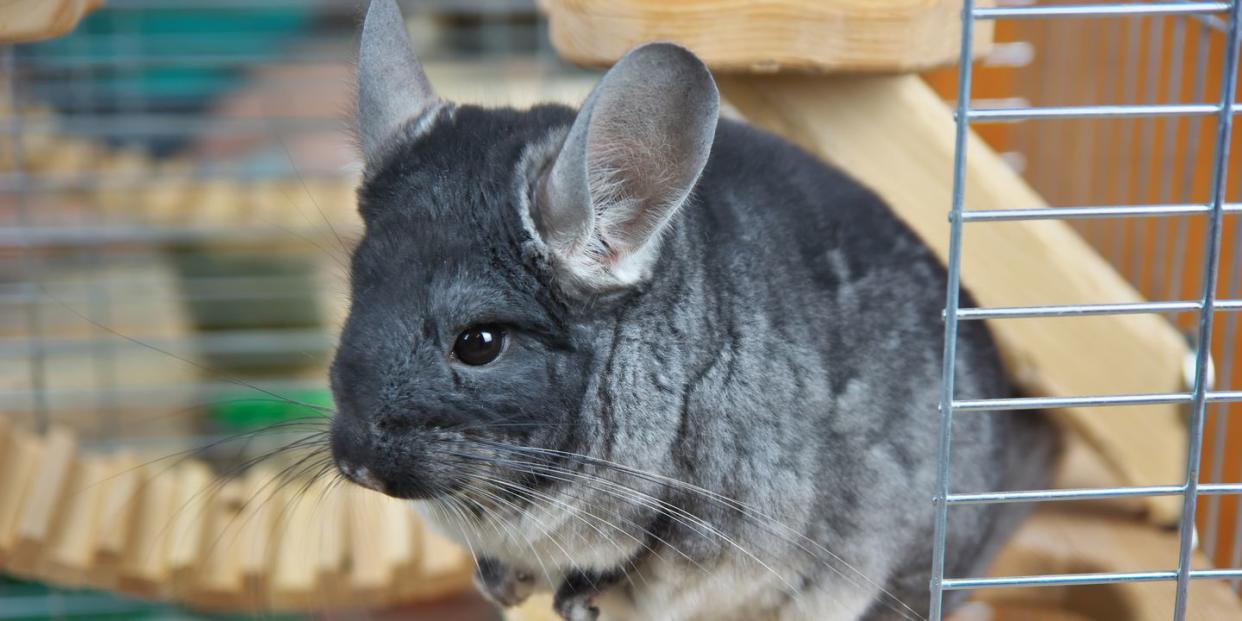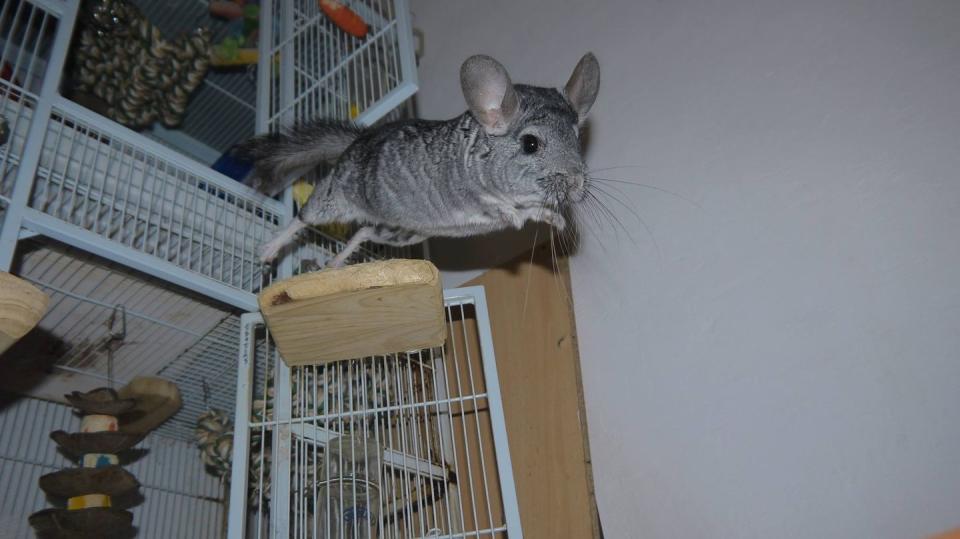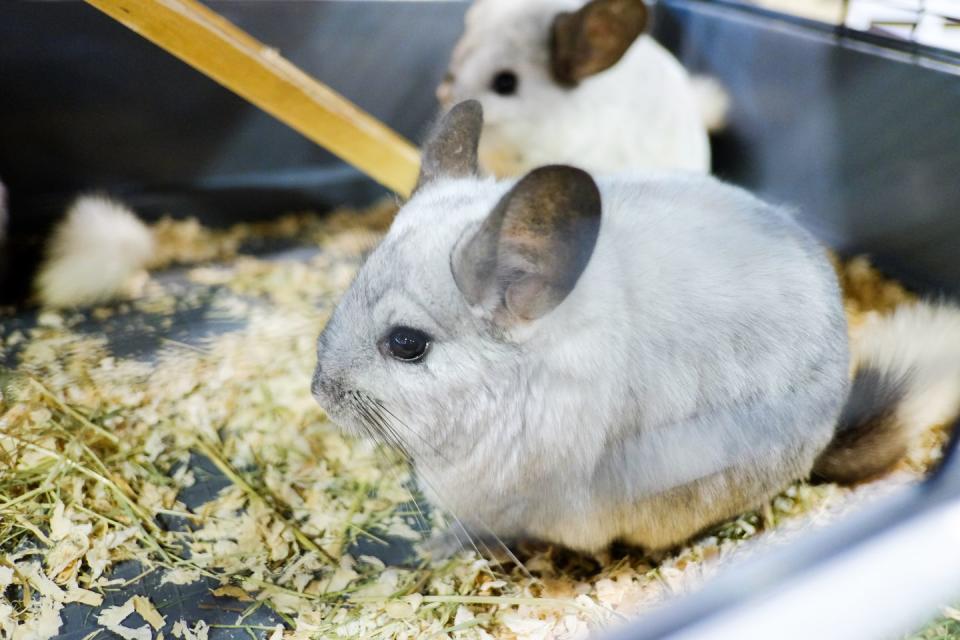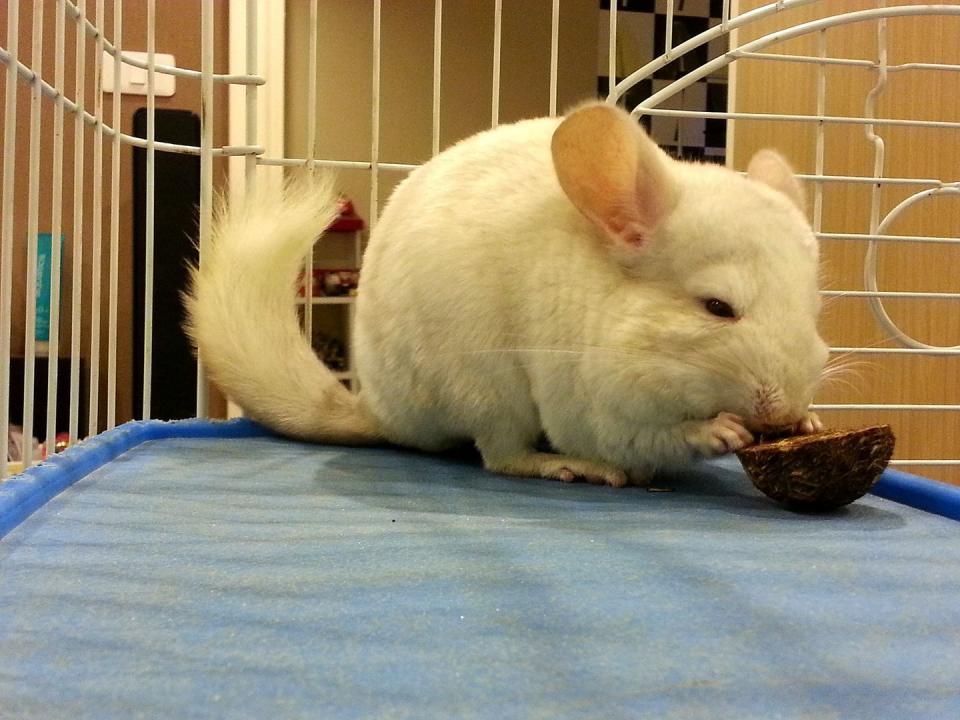Thinking of Getting a Chinchilla As A Pet? Here's What You Need to Know

Though they're technically rodents, chinchillas are arguably some of the most cuddly and beautiful animals. And with some training from a young age they can become best friends with their human owners. They are considered by most people to be exotic pets, and are often for sale at exotic pet shows. Here's what you need to know about chinchillas if you're thinking of having one as a pet, because they're a little more quirky than your average pet.
Research reputable buyers ahead of time
Chinchillas are considered an endangered species, and it is illegal to hunt and catch wild chinchillas as a result, according to National Geographic. So if you're considering buying a chinchilla, you should do your research first and find a reputable chinchilla breeder.

You might be able to find a chinchilla at a local pet store, but Chinchilla.co notes that chinchillas at pet shops can have lowered immune systems if the shop hasn't provide them with quality care. Reputable breeders, on the other hand, are chinchilla experts. Not only will they be able to walk you through the exact care your chinchilla requires, they often know the different personalities of their chinchillas, so they can match you with one that's more calm or energetic, depending on what you're looking for.
Veterinarian Adam Denish, of Rhawnhurst Animal Hospital in Philadelphia, told PetMD that you should examine any chinchilla you're thinking of buying for patches of missing fur. Their eyes should also be bright with no redness or drainage, and their enclosure should be free from diarrhea.
They're very high energy
Chinchillas love to run around and, as a result, Vet Street notes that their enclosures need to be bigger than your average rodent: about 4 feet by 4 feet by 3 feet. Their enclosures should also be multi-level with ramps and platforms, or have an added PVC pipe section that they can go into if they feel threatened, according to PetMD. T

The materials the cage is made out of also matter: PetMD suggests a plastic-bottomed cage and cautions away from wire-bottomed cages, which can hurt chinchilla's feet. Bedding type is important too, and most vets recommend paper-based products. Cages with bars made with zinc can also be toxic for chinchillas.
Their fur requires special attention
Chinchillas are known for their incredibly soft and dense fur, which helps them maintain their body temperature at high altitudes (they're from the mountains of North Chile, according to Nat Geo). This means you want to keep them in a cool, quiet part of your house where the temperature doesn't get above about 77 degrees Fahrenheit (25 degrees Celsius), according to the Spruce Pets.
Chinchillas groom themselves with dust baths, and should never be bathed in water. Most pet stores sell chinchilla "bath houses," which are just little boxes that you can fill with chinchilla dust, also available at pet stores. The dust in their bath does get dirty, so Vet Street suggests changing it every two to three weeks.

One of the chinchilla's strangest fur quirks: they can release it to get away from predators, according to Vet Street. When they release a patch of fur it doesn't do any damage to the skin, but it will take it a few months for the fur to grow back. You should hold them gently, with one hand under their belly and the other supporting their hind end. If you need to hold them still, Vet Street suggests wrapping the chinchilla in a towel.
Chinchillas are nocturnal
In the wild, chinchillas are most active at night, though the Spruce Pets notes that they have also been called "crepuscular," which means they're most active at dawn and dusk. In the daytime, they should be kept in a more quiet area, and provided with a wheel or other toys so they can get some exercise at night.
The Spruce Pets also notes that chinchillas prefer to have a consistent feeding and handling routine, and changing it up too much might stress them out.
They can take time to tame
If possible, you should start handling a chinchilla from a young age. Older chinchillas who haven't been handled much aren't likely to ever come around to it, according to the Spruce Pets. Even some chinchillas who are handled at a young age might not be very interested in being held depending on their personality. The Spruce Pets suggest moving slowly and being patient with your chinchilla to gain its trust over time.
They are picky eaters
Chinchillas require a specific diet that isn't exactly "low maintenance." They need lots of hay: Vet Street recommends feeding timothy hay to non-breeding adult chinchillas, and alfalfa to younger chinchillas up to 9 months old.

NC State Veterinary Hospital recommends pelleted feed formulated specifically for chinchillas. You should avoid feeds with loose seeds, nuts, or dried fruit. With loose feeds, chinchillas will pick out the parts of that feed that they like best, refusing to eat the other parts with essential nutrients — just like kids who refuse to eat their vegetables. The pellets combine everything they need and don't allow them to pick and choose. NC State also recommends giving them small amounts of fresh produce daily and avoiding sugary treats.
They require veterinary care
Chinchillas teeth grow two to three inches each year, and if their teeth don't align properly so that they wear down on each other, they can develop a condition common in rodents called malocclusion, according to Sawnee Animal Clinic. You can often see it in their front teeth, which will grow out of their mouths. If this happens, they'll need veterinary care to trim the teeth down and prevent them from causing them pain, which can keep them from eating and cause other health issues.
Even chinchillas without malocclusion should be provided with a "chinchilla block" or pumice block, which will trim down their teeth when they chew on it, according to the Spruce Pets.

Young chinchillas should be examined by the vet on a yearly basis to check their overall health, according to NC State Veterinary Hospital, and older chinchillas with health problems will likely need to be seen more often.
Chinchillas can also become sick, and NC State notes that they are good at hiding sickness, so if you should familiarize yourself with common symptoms, such as decreased appetite, lethargy, and sneezing or nasal discharge.
Chinchillas live for a long time
If you're considering a pet chinchilla, you should be prepared for a serious commitment, like any pet. Chinchillas in captivity can live up to 15 to 20 years, according to Animal Diversity Web.
Chinchillas are beautiful and energetic pets, but they do require some special attention and a lot of patience. Watching a chinchilla bath is totally worth it though.
You Might Also Like


